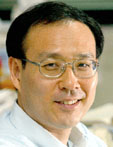 Professor Oh Se-jeong, Dean, College of Natural Sciences
Professor Oh Se-jeong, Dean, College of Natural SciencesPeople seem far from excited. Everyone’s feeling the chill of the iced-over economy and the cold weather. Less-privileged people are having difficulty eking out a living, and no one seems to know how long the troubles will continue.
The global economic turmoil sparked by greed on Wall Street is hitting innocent, common people in Korea. In times like this, we need to help each other to overcome. We should think about others and make sacrifices.
The government and all members of society must do their best to ensure that no one falls behind.
The adversity we’re now going through will eventually come to an end. Many predict that after the hard times, the world as we know it will be very different.
We experienced a foreign exchange crisis a decade ago and the domestic economic framework was significantly changed.
As the present difficulties are even larger, it is likely to change social and economic frameworks around the globe. As we sort out how to get through to the other side, it is important for us to prepare for the future, after the storm has passed. Even though we are now in unprecedented times, we can prepared for what’s to come, and become an advanced country when all is said and done.
It is therefore necessary to predict how the world will be different after the crisis. Of course, this is no easy task, but the reasons behind the economic meltdown can offer us several clues, along with the opinions of experts.
First, the importance of the real economy, such as the manufacturing industry, will be emphasized. The U.S. issues that sparked the downward spiral clearly showed that economic activities that don’t create actual added value are nothing but a mirage.
As such, the economic might of Japan, Germany and China, countries with strong manufacturing industries, will likely grow. This tendency can offer a good chance for us as well, because the manufacturing industry still makes up a bigger chunk of our economy than the service industry.
Second, saving resources and energy will become very important. Waste of limited resources will no longer be tolerated around the world, as it was in the past. That’s why many leaders of the world, including U.S. President-elect Barack Obama and President Nicolas Sarkozy of France, are talking about developing green technology as a way to overcome the current economic crisis.
It’s clear what Korea must do. First, it must develop technologies that can add value to the real economy. In particular, we must make efforts to train and keep talented human resources in the science and technology field.
Bill Gates, the chairman of Microsoft, emphasized education, research and development in science and technology as vital to overcoming the economic crisis.
We should not cut investments in the future just because times are hard for now. During the foreign exchange crisis, our companies and government fired people with science and technology backgrounds.
As a result, young people didn’t want to study science and technology, and our potential for growth was severely damaged.
We should not repeat the same mistake.
It takes a long time to produce talented workers in the science and technology field, and if they quit working, it’s hard for the field to recover.
Second, Korea needs to put its energy into developing green technology. We are not a leading country in terms of such developments.
But most advanced countries started research and development in eco-friendly fields relatively recently, so we can catch up with them depending on how much effort we put into it.
Solar power generation and hybrid vehicles are good examples of items we can work toward perfecting. But there are unlimited possibilities when it comes to adding environmentally friendly factors to more conventional industries.
For instance, new parts that consume less electric power can be developed for home appliances or factory equipment.
Green technology will become more and more important because of intensified international regulations and the exhaustion of resources around the world. Thus, it is key that we get onboard.
The winter seems to be getting colder and colder.
But even when times are harsh, we can find hope by preparing for the future.
December 24, 2008 *The writer is a professor of physics and the dean of the College of Natural Science at Seoul National University. Translation by the JoongAng Daily staff. by Oh Se-jung

